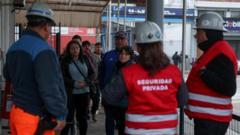Villa Baviera, formerly Colonia Dignidad, was notorious for being a place of torture during Augusto Pinochet's dictatorship. As the Chilean government plans to expropriate land for a memorial site, residents express divided feelings about honoring the past versus preserving their community.
Villa Baviera: From Cult Hideout to Memorial Site Amidst Controversy

Villa Baviera: From Cult Hideout to Memorial Site Amidst Controversy
The Chilean village, once a site of torture under Pinochet's regime, is set for transformation into a memorial, sparking mixed reactions among residents.
Once a picturesque village in central Chile, Villa Baviera is steeped in a haunting history that belies its Bavarian-style architecture and serene appearance. Formerly known as Colonia Dignidad, this settlement was founded in 1961 by Paul Schäfer, a manipulative cult leader who allied himself with Augusto Pinochet's military regime. Under his leadership, the community became a place of severe punishment and abuse, particularly for children, many of whom were forced into labor and subjected to sexual exploitation.
Following Pinochet's rise to power in 1973, Colonia Dignidad served as a secretive torture site for political dissidents opposing the regime. Numerous individuals branded as enemies of the state vanished into its dark interiors, with reports indicating that hundreds of political prisoners suffered horrific fates within its walls. The legacy of terror left by Schäfer, who died in 2010, still resonates in Chile, prompting actions to remember and memorialize the victims of this tragic chapter.
The Chilean government recently announced plans to expropriate a portion of Villa Baviera to commemorate Pinochet's victims, but these intentions have sparked contention among its modern-day residents. While some view the transformation as a vital step towards remembrance and education, others fear it may displace them from their homes and businesses. With fewer than 100 adults residing in the area, the community’s voices are varied, reflecting a spectrum of experiences marked by trauma and resilience.
For many former inhabitants, like Dorothee Munch, the memories of growing up under harsh conditions linger. Munch recalls her early years spent in barracks-like dormitories and laboring under fear. Others, like Georg Klaube, share stories of unimaginable suffering, including abuse and electric shock treatment. Both support the memorial, stressing the importance of truth and acknowledgment regarding past atrocities.
However, conflicts arise, particularly concerning residential properties, as plans to create a memorial site encompass homes and businesses that present a threat of dislocation for current residents. Erika Tymm, another former resident, expresses a deep connection to the community, asserting that memories and shared experiences can only be preserved by staying.
While the expropriation aims to create a space for reflection and dialogue ensuring "atrocious crimes" are not forgotten, it raises ethical questions on ownership and the rights of those who were once victims themselves. With the Chilean Minister for Justice advocating for the memorial's significance alongside compliance with legal standards, the conversation continues, bridging hopes for healing with the realities of personal losses faced by many.
As Villa Baviera transitions into a site of memory, it will serve as a powerful reminder of the resilience required to move forward while emphasizing the necessity of revisiting painful histories to pave the way for understanding and reconciliation among all Chileans.

















